Thanks to the rise of the post-credits sequence, many of us have become all too familiar sitting through 5-10 minutes of closing credits, discovering odd things like how Bryan Singer had 4 personal assistants on Days of Future Past but Hugh Jackman only had 1. Well, one odd thing a lot of people noticed last year was that nowhere in the closing (or opening) credits of The Wolverine was there any kind of acknowledgement of Chris Claremont and Frank Miller, the guys who created the comic min-series from which the film took its story. You wouldn’t be able to get away with that nonsense if you were adapting an actual novel, but for a variety of reasons it’s no big deal when it’s a comic book.
When asked how he felt about it, Claremont sued for peace, “The thing about the credit … We did this mostly for fun. It was earning a living, but we did it for fun. There are still grace notes that make you grin. In the first Wolverine movie, when he looks at Silver Fox and says [the line I wrote], ‘I’m the best at what I do, but what I do best isn’t very nice’ — at the screening, I was sitting there going, ‘Yesss!’ and my wife is elbowing me in the hips to stop it. Those moments are cool.” However, the man who actually created Wolverine, Len Wein, was a little less willing to play nice, “I have not seen a dime off of any Marvel stuff, nor do I have a credit on the Wolverine film. Hugh Jackman is a lovely man, and at the premiere he told the audience that he owed his career to me and had me take a bow. It was very gratifying and very nice. I would have preferred a check.”
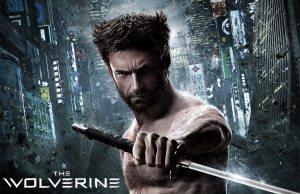
It’s worth noting that Hugh Jackman now reportedly carries a net worth of $100 million, built mostly off of his time playing Wolverine.
The History of Exploitation
This is simply the reality which most comic book writers/artists live with: the industry thrives on wildly screwing over the creatives, ensuring that they are either not credited, or not fairly compensated. This goes back to the very beginning of super hero comic books, with Jerry Siegel and Joe Shuster creating Superman but not receiving due credit or even royalties until winning their day in court in 1975.
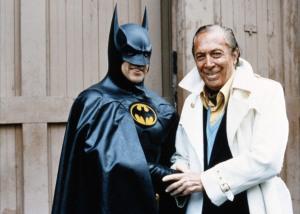
Bob Kane with Michael Keaton on the set of the first Tim Burton Batman film
Batman’s co-creator Bob Kane fared far better, initially securing a deal guaranteeing him a steady gig with DC as well as his name on every Batman comic. He used his modest fortune to simply pay other people to do all of his work for no credit (or royalties), a dirty little secret known only to industry insiders until many decades later.
The Siegel/Shuster Lawsuits
Some comic book people simply learn to live with this kind of thing, as Chris Claremont apparently has. Others take a more militant approach, like Len Wein. In fact, there was a period of time last year where it was unclear whether or not Warner Bros. would be allowed to release Man of Steel because DC was still in court fighting the efforts of Siegel and Shuster’s heirs to return the copyright for Superman to them. According to current copyright law, the creators or their heirs can seek to regain copyrights they previously assigned to a company 56 years after first publication. Siegel and Shuster’s heirs figured they had a solid legal claim since the original contract with DC was signed back in 1938. However, they ultimately lost because someone signed something they really shouldn’t have in 1992, though prior agreements reached with DC entitles the Shuster heirs to a “pension” of $25,000 per year (as per the ’92 agreement) and the Siegel heirs to an ongoing 6% of gross revenues (as per a 2001 agreement).
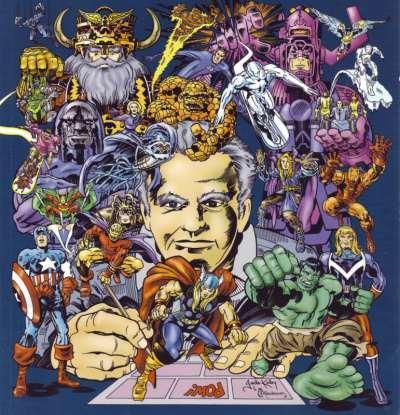
Jack Kirby and all the Marvel Characters He Co-Created
The Jack Kirby Lawsuits
They’re making out like bandits compared to Jack Kirby’s kids. Kirby co-created Captain America in the ‘40s and then in the early ‘60s he and Stan Lee had one of the most legendary runs in comic book history, co-creating The Fantastic Four, The Incredible Hulk, Thor, Iron Man, the original X-Men, Black Panther, and many, many other characters. However, Kriby left over a bitter dispute with Stan Lee over the amount of credit he was taking for what was either their or simply entirely Kirby’s work. Kirby’s estate is now seeking to terminate copyrights which could result in Fox losing complete control over The Fantastic Four and X-Men, and Disney/Marvel Studios over the Avengers characters. The courts previously shot this down because Kirby’s work was technically done on a freelance basis that made him “work for wire” which leaves him absolutely no legal claim to any copyright.
Hollywood Reacts
Them’s fightin’ words, mostly because the rest of Hollywood is taking notice and realizing that the precedents being set in these cases is causing the gradual elimination of the copyright loophole allowing creators to try and regain control of their creations later in life (check out this THR article for a more thorough explanation). Suddenly, actors, writers, and directors realize that years down the road they too could get screwed over, just like Jack Kirby and his heir’s due to courts deeming their creations to have simply been “works for hire.” The Screen Actors Guild of America has joined with the Directors Guild and Writers Guild to throw their support behind the Kirby estates’ petition for their case to be heard by the U.S. Supreme Court, concluding, “As many famous works approach their statutory renewal periods, the creators and their heirs will find that the statutory renewal or termination rights are not theirs to exercise. Even if they can afford the cost of litigation, they may find it impossible to overcome the barriers erected by the lower courts.”
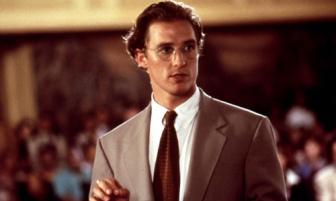
If that sounded boring to you now re-read it but imagine it being delivered by an endearing southern lawyer out of a John Grisham novel.
As you might expect, this case actually started back in 2009 after Disney ponied up $4 billion to buy Marvel Studios, at which point every single film they had in development was based on one of Kirby’s co-creations. Unlike Smilin’ Stan Lee, Jack Kirby didn’t live long enough to see the comic book movie boom kicked off by Spider-Man at the start of the new century. However, he left behind four children who currently earn nothing from their father’s creations. So, almost immediately after the Disney deal they enlisted the aid of the same law firm working for the Siegel & Shuster heirs to plan their next course of action. Their initial aim was not to wrestle control of the copyright away from the studio, but to simply be allowed at the table to negotiate some kind of interest in the profits or a settlement.
While they’ve been struggling to get to that proverbial table, Stan Lee has been profiting from the various deals he made with Marvel over the years, and making cameos in just about every single Marvel film, even voicing a recurring character modeled and named after him on DisneyXD’s Ultimate Spider-Man. This is not to say that Lee resides in some luxurious mansion, as is made perfectly clear in the documentary Stan Lee With Great Power: The Stan Lee Story. He recently told Playboy, “Marvel always owned the rights to these characters. If I owned them, I probably wouldn’t be talking to you now.”
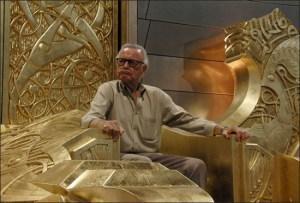
NOT Stan Lee’s house, but instead Lee sitting on Odin’s throne on the set of Thor
Still, Jack Kirby’s kids can’t help but harbor some bitterness toward Lee, despite his ever-avuncular nature. Lisa Kirby told the Los Angeles Times, “A lot more people know the name Stan Lee than the name Jack Kirby. I’m not putting down Stan Lee’s talents but it’s difficult for us to see that he does dominate the credit. That doesn’t reflect the work or the reality. “
What was the reality? Well, Kirby not only single-handedly established the visual flair that would come to define Marvel with his drawings but due to the unique way in which the comics were put together at the time he also unofficially crafted many of the stories. He’d draw the story without any kind of script, sometimes based on conversations with Stan Lee beforehand, sometimes not, and Lee would go back in after him and create dialogue to fit the action. It’d be like if someone simply improvised storyboards for a film without any kind of script, and then someone else came along and added dialogue but received sole credit for the script while still making sure everyone knew that other guy drew some real fancy pictures.
Stan Lee Thinks Jack Kirby Was Treated Fairly
None of that really matters to the courts, though, because the lawsuits aren’t about credit; they are about compensation. However, Kirby’s old partner Stan Lee thinks Jack Kirby was treated fairly back in the day:
As far as what [Jack Kirby and Spider-Man co-creator Steve Ditko] were paid, I had nothing to do with that. They were hired as freelance artists, and they worked as freelance artists. At some point they apparently felt they should be getting more money. Fine, it was up to them to talk to the publisher. It had nothing to do with me. I would have liked to have gotten more money too. I never made an issue of it. I got paid per page for what I wrote, the same rate as the other writers-maybe a dollar a page more.
If you ask me, should they have been paid more? Then you have to say, shouldn’t John Romita have been paid more? Shouldn’t Gil Kane have been paid more? Shouldn’t John Buscema have? They were all great Marvel artists. In other words, if somebody draws a strip and it becomes successful, do you go back? I don’t know. That’s the reason I’ve never been a businessman and never want to be a businessman. I don’t know how to deal with those things…
And twice, not once, I offered a job to Jack Kirby. I said to him, “Jack, why don’t you work for Marvel with me?” I was the art director at the time. I said, “You be the art director. I’ll just be the editor and head writer, and you’ll have that security.” He wouldn’t do it. He didn’t want to. I would have loved him to work side by side with me. I used to marvel at the way Jack drew. He would draw something as if it had appeared in his mind and he was just tracing what he had thought of already. I never saw a man draw as quickly as Jack did. “Come work with me, Jack,” I said. But he said no. He didn’t want a staff job. With him, as with Ditko, I don’t see where they were unfairly treated.
Mad Men’s Don Draper operates from an Employee Handbook where it’s acceptable to resolve a despite like this by simply screaming out, “That’s what the money is for!”, in this case “the money” being the salary Kirby received in exchange for his work as freelancer:
Yes, but was the money someone like Kirby received really enough? Or, like Stan Lee argued to Playboy, was he treated more than fairly?
The comic book industry is and always has been ruled by the publishers, freeing Marvel to score quite literally billions off of characters like Iron Man without having to worry about sharing any of that with the family of the guy who co-created the character to begin with. That type of thing is nothing new, causing comic book writers and artists to repeatedly attempt to unionize over the years, failing in their efforts every time. While the kids of Siegel, Shuster, and Kirby fight for their piece of pie, still living artists like Bill Mantlo, the co-creator of Guardians of the Galaxy‘s Rocket Raccoon, have to turn to charity to cover medical expenses.
What’s Next
Hollywood used to look at all of this with a definite, “Better them than us” mentality. However, now Hollywood has realized that what’s happening in the Jack Kirby case could impair the ability of actors, writers, and directors to reclaim rights over their creations later in life. So, suddenly it’s all, “Yeah, the Supreme Court totally needs to hear this.” Let’s see if they do because these “work for hire” lawsuits don’t seem to be going away anytime soon. However, with the way these things have been playing out in the courts lately the odds are more in Marvel’s favor.
Sources: LA Times, THR, Escapist, ComicsAlliance, Bleeding Cool

